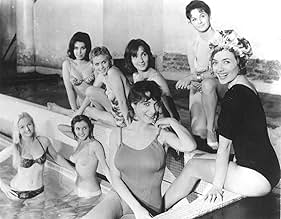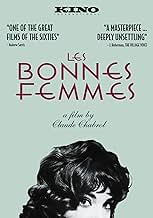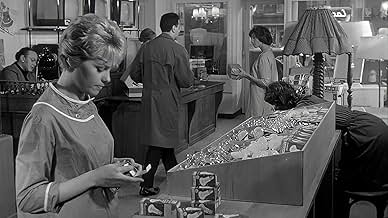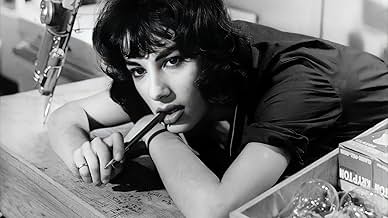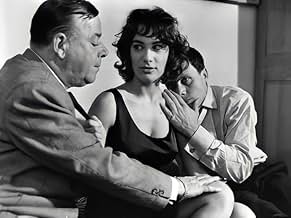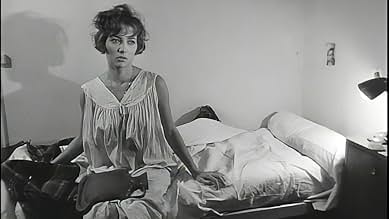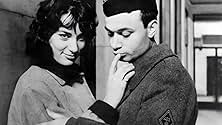ÉVALUATION IMDb
7,2/10
3,3 k
MA NOTE
Ajouter une intrigue dans votre langueFour Parisian women navigate the world of romance and daily life looking to fulfill their dreams but often find real-life to be inescapable.Four Parisian women navigate the world of romance and daily life looking to fulfill their dreams but often find real-life to be inescapable.Four Parisian women navigate the world of romance and daily life looking to fulfill their dreams but often find real-life to be inescapable.
- Director
- Writers
- Stars
- Prix
- 1 nomination au total
Gabriel Gobin
- Le père d'Henri
- (as Gabriel Gobain)
Avis en vedette
Just to prove that portraying males as all-negative is nothing new, see Les Bonnes Femmes: the employer with wandering hands, the drippy suitor, his bossy Dad, the snobbish fiancé, the lurking psycho, the bad-jokes bully-boy and his fatty hanger-on, the absent lad on national service. Every one of them is no good. And yet the four shop-assistants are no better, they exist only for the men. Whatever the fellows throw at them, they're up for it. It's a chilling worldview, with a cynical twist at the end, (plus a tacked-on coda that seems to be from another movie). Along the way, there's some really hammy acting from the girls' employer that clashes badly with the realistic mood, and some longueurs as the girls get bored at work and we get bored right along with them. The young Bernadette Lafont is a joy, but she fades out in Reel Three when the lovely Clotilde Joano comes to the fore. Whatever happened to Clotilde? Her subsequent career was undistinguished, and she died at age 42. This is mostly a watchable slice of Paris life from the late 50s, although the Algerians who caused so much mayhem only a few years later are nowhere to be seen.
In Paris, Jane (Bernadette Lafont) and her colleague and roommate Jacqueline (Clotilde Joano) are walking home when the friends Marcel (Jean-Louis Maury) and Albert (Albert Dinan) hit on them and invited them to go to a restaurant. Later, Jacqueline goes home while Jane goes to Albert's apartment and has a threesome. On the next morning, they go to the appliance store Maison Belin where they work with Ginette (Stéphane Audran), Rita (Lucile Saint-Simon) and the spinster Mme Louise (Ave Ninchi), who is the cashier. The owner Monsieur Belin (Pierre Bertin) is an abusive boss, and they hate their work. Jane has a boyfriend but is a promiscuous party girl. Ginette has a secret life at night, singing in a music hall. Rita has a bourgeois fiancé, Henri (Sacha Briquet), who does not respect her and believes she is empty. Jacqueline is naive and believes in love, and when a biker follows her everywhere with his motorcycle, she believes he is her shy prince charming. When Jacqueline meets him at a public swimming pool, they introduce themselves to each other and the biker Ernest Lapierre (Mario David) dates her. They go to a remote restaurant in the countryside, and he asks her why she dated him without knowing him. But soon Jacqueline learns who he is.
"Les bonnes femmes" (1960), a.k.a. "The Good Time Girls", is the fourth film by Claude Chabrol disclosing the dull life of four young working-class women in the job at an appliance store. Their moments of joy are after hours, each one with a lifestyle. Jane is a promiscuous woman; Rita does not have self-respect; Ginette likes to sing in a music hall; and Jacqueline, who seems to be the youngest, is a dreamer. In common, they are treated like objects. It is funny to see how silly some men like Marcel and Albert were in those years in Paris. The conclusion is a great surprise from Chabrol. My vote is seven.
Title (Brazil): "Mulheres Fáceis" ("Easy Women")
"Les bonnes femmes" (1960), a.k.a. "The Good Time Girls", is the fourth film by Claude Chabrol disclosing the dull life of four young working-class women in the job at an appliance store. Their moments of joy are after hours, each one with a lifestyle. Jane is a promiscuous woman; Rita does not have self-respect; Ginette likes to sing in a music hall; and Jacqueline, who seems to be the youngest, is a dreamer. In common, they are treated like objects. It is funny to see how silly some men like Marcel and Albert were in those years in Paris. The conclusion is a great surprise from Chabrol. My vote is seven.
Title (Brazil): "Mulheres Fáceis" ("Easy Women")
Chabrol's career is often seen as moving from the naturalism of his early films to the extreme stylisation of his great mid-period. It's not as simple as that, but in 'Les Bonnes Femmes', Chabrol achieves a balance between the two that he has rarely equalled. The story of four shopgirls, their work and social lives, has all the plotless and poignant banality of realism, while the closing third, with its move from Paris to the country, its seducer-cum-motorbike-riding-devil (reg. no.: 666) talking about the Creator, as little schoolboys called Balthasar pass by; and its closing vision of Hell/Purgatory bespeak a more Cocteau-like world of mythology and religion. But there is Cocteau too in the framing of Jacqueline in the shop window, while Chabrol's filming of treacherous nature later on is uncommonly vivid. Although 'Bonnes' is his least typical film, it is also his most lovable, and seems to get richer with the years.
The film shows a weekend in the lives of four Parisian shop girls, from their Friday night out in the nightclubs of Paris through to a Sunday outing into the countryside. All four dream of escaping their humdrum existence: Ginette (Stephane Audran) is trying to start an alternative career as a music hall singer, Rita (Lucile Saint-Simon) is engaged to a shop owner, Jane (Bernadette Lafont) is wined and dined by two married businessmen, and Jacqueline (Clothilde Joano) falls in love with a biker who is stalking her. The monotony of the girls' lives is shown as they spend Saturday in the shop just waiting for the moment when they can go home. At the same time Chabrol shows a fascinating portrait of the city at work and at play. The storyline holds the viewer's interest, the acting is excellent (especially Lafont, and despite some terrible overacting from the girl's boss), and the director hints at some of the gruesome shocks of his later films.
The film's English title "The Good Time Girls" capture the essence of the film--four different women, working in a shop, moonlighting as they are not rich, and hoping to find a decent spouse. The shop itself presents the lecherous owner (who "keeps his distance") and an elderly cashier who hides her interest in BDSM (her fetish is a cloth dipped in the blood of a BDSM convict who was guillotined, with an insinuated relationship with a customer who asks her for money and gets it!), a beautiful Stephane Audran (moonlighting as a singer), and the attractive Clotilde Joano. And there is a murder, which hangs in the air without the outcome discussed further--one of the weak points of the over-rated film.
Le saviez-vous
- AnecdotesCaused so much resentment among the public upon its release that some went as far as breaking seats in theaters as sign of protest.
- GaffesAfter Ernest strangles Jacqueline, he rips his coat out from under her and flips her over. The supposedly dead Jacqueline immediately moves her arm to catch herself from going face first into the mud.
- Citations
Monsieur Belin: My pleasure in life is to reprimand little girls... It's my prerogative.
- ConnexionsFeatured in Le fils de Gascogne (1995)
Meilleurs choix
Connectez-vous pour évaluer et surveiller les recommandations personnalisées
- How long is The Good Girls?Propulsé par Alexa
Détails
Box-office
- Brut – États-Unis et Canada
- 6 578 $ US
- Fin de semaine d'ouverture – États-Unis et Canada
- 6 578 $ US
- 15 août 1999
- Durée
- 1h 40m(100 min)
- Couleur
- Rapport de forme
- 1.66 : 1
Contribuer à cette page
Suggérer une modification ou ajouter du contenu manquant

